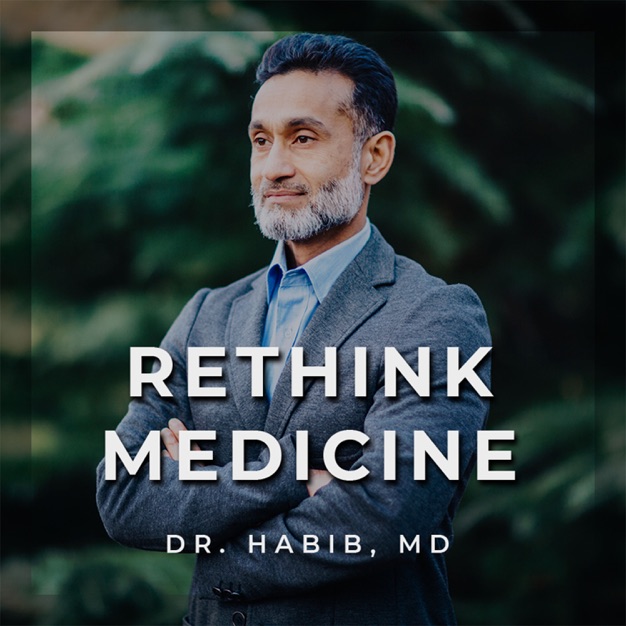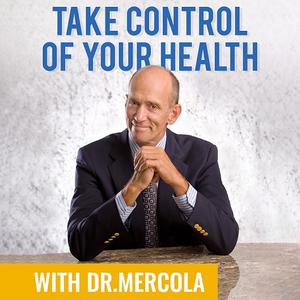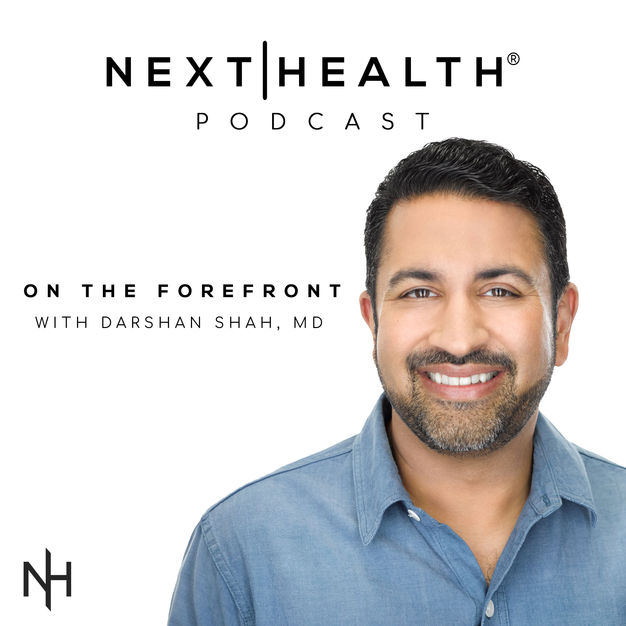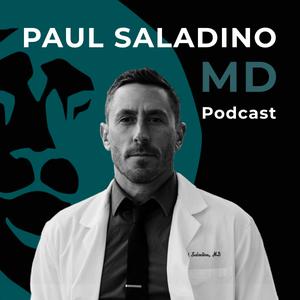
Rethink Medicine with Dr. Habib
Next Health
Dr. Habib rethinks the way doctors practice medicine and aims to educate people on how to Predict and Prevent disease while prolonging life
- 33 minutes 2 secondsEp. 4 - Designs In Health - 3D Medicine
Dr. Habib discusses designs in health and talks about 3D Medicine.
27 February 2020, 2:11 am - 29 minutes 21 secondsEp. 3 - Why current healthcare is not good enough for you
Dr. Habib talks about why the current healthcare system is not good enough for you.
Transcript below:
Hi this is Dr. Habib. Today I want to try to go over what determines whether a doctor discusses blood pressure versus arthritis versus cholesterol on any given office visit. So first, some of the logistics, and then I'll delve into the medial aspects, and finally, hopefully the way it should be done. So you may imagine that the doctor's very smart. He's figured out which is the most important criteria for that office visit. And what I want to tell you is that let's look at what is involved in that decision making. Number one, the duration of the visit. So if you have a physical, it's a long visit, minimum 30 minutes. It could go long as an hour. Just depends on the doctor, really. It's beyond what depends on the doctor. If he wants to get reimbursed, he has to spend about 45 minutes, go over certain points to be able to check off, in order to call it a physical for reimbursement purposes. So it's really not about what he wants to do and how much time he wants. He's being driven by what reimbursement he's looking for. So physical is a complicated, or annual physical, so based on the fact that it's gonna be more detailed, a longer process, then it should warrant more time. But for the average visit, it's about 15 minutes. My joke is and it's not really a joke, 'cause it's a serious joke, it's five minutes to check in with the receptionist and your insurances and all that paperwork. And it's probably about a few more minutes with the medical assistant checking the blood pressure, the height, the weight, and then you get about five minutes with the doctor. And a few more minutes to check out again. So that 15, 20 minutes was literally only five minutes with the doctor. And that's not a joke. That's kind of unfortunately the reality. And in that short period, let's just say, that short period of time, that office visit, how did that doctor figure out whether we should talk about the blood pressure today, the cholesterol today, the acid reflux, the joint pain, the rash, how did he figure that out? Well, like I tell you, if somebody came in with an acute problem, it's different. Your shortness of breath. That could be mild, but we're trained to look at all the possibilities, so even though it may seem simple, we should be prepared for a long visit because it could be a pneumonia. It could be a pulmonary emboli. It could be a chronic obstructive lung disease. It could be asthma. It could be a inflammation, a pneumonitis. The point I'm saying is that, that for acute problems, it's variable, but things like blood pressure, cholesterol, diabetes, these are very stable, and so the doctor's already pre-programmed himself to know, I'm only going to spend 15 minutes, of which you know it's not really 15 minutes, on cholesterol, blood pressure, diabetes. And so the myth is, you would imagine that the doctor had figured out which is the priority, and I'm gonna at the end of this video, dispel that. Dismiss that concept. And what I want you to understand is that, he is going to be discussing a subject matter with a duration of time that's gonna match the reimbursement, so he's actually practicing under the parameters, of what the insurance reimbursement. That means diagnostic codes, procedure codes, reimbursement. And not because of what he deems is the most important thing. So let's use some examples. Cholesterol's pretty benign. You have to have cholesterol for a long time, where there is any association with cardiovascular problems. Blood pressure, same thing. The fact is that you could have blood pressure for one week, one month, six months, one year, no acute problem will happen. In fact, we know it takes decades for the blood vessels to get stiffened up before the heart starts to get bigger. And so I'm not condoning waiting a decade without treating it. All I'm saying is that there are certain things that need more of a priority. Like acid reflux. Look you have pain and the pain is because either there's too much acid in the stomach or gastritis, or that acid is going up behind the chest. Gastroesophageal reflux disease. Either one is at the very least, uncomfortable because after you eat, you could have pain. When you're trying to sleep at night, you cough. The reflux is irritating the oropharyngeal area. You could have chest tightness. You could even mimic chest pain, like you're having a heart attack. In fact most of the hospitalizations, at least the 24-hour observation is where people go in with chest pains, majority of which is acid reflux because by default they excluded heart attack, okay? Now so that's fairly acute and it should be addressed. So you'd imagine that the doctor would maybe give you a strategy like, okay why don't we see if can do lifestyle changes. Get rid of dairy, get rid of acidic products like citric acid from foods, maybe cut that back on tomatoes and bananas, lose a little weight, And if the symptoms are a little bit more severe, then maybe he'll say why don't we use a medication over the next few weeks just to calm down the acid because you know, beyond the pain, it's eroding, it's damaging the lining in the stomach, damaging the lining in the esophagus. There's complications if you don't manage that. And I can go into that a little bit later. But so with the medication, you would temporarily cut the acid, giving the lining time to heal and the doctor has now given you advice on how to change your lifestyle. And so at the end of the four to six weeks, that's how long the FDA has approved the acid lowering medication for, and when you stop the medication, theoretically your symptoms should be over. But as you know, most people's symptoms persist, so doctors continue on that medication. So here I want to put it together for you now, is that about one in four people have acid reflux disorder of some kind. That means gastritis, esophageal reflux, mild, moderate, severe, the whole bucketload of spectrum of people. It's about one in four. It's interesting how adults, particularly between say 40 and 60, there's about one in three have high blood pressure. Mmmm that's interesting. So could there be a link? And now I'm getting to how the doctor should be thinking and putting it together in determining when the office visit should occur and what should be discussed, as opposed to, well you know I've got 15 minutes so I'll just bring you in for blood pressure 'cause that's all the insurance will reimburse me. I'll bring you in for 15 minutes for cholesterol 'cause that's all the insurance will reimburse me. Just being a devil's advocate, when the doctor, a good doctor, if he was so good and he just addressed everything at once, he will not get reimbursed for everything at once because it's all about that time factor, right? Time factor and that's unfortunate because that determines the activity, the behavior, the decision-making of the medical practice, including the doctor. That's unfortunate. So let me summarize again, the doctor's not deciding the condition to manage based on priority, unless it's an acute problem, like breathing problem, a chest pain, or of the chronic stable conditions, blood pressure, cholesterol, diabetes. Those don't determine, those don't require any prioritization, unless it's something like an acid reflux. But here I'm trying to tell you that acid reflux is quite common. One in four people. Blood pressure is even more common, one in three in that of population. Could there be a link? Well here's the link. When you are being treated with acid lowering medication, and that means that the acid in your stomach has been minimized, you will not be able to produce a lot of products like nitric oxide. So nitric oxide helps blood vessels open up increase blood flow. When you open up blood vessels, they are under less pressure, so blood pressure would come down. Conversely, if you're shutting off the acid, and your body's not making nitric oxide, then theoretically you have tighter blood vessels, so that's where the blood pressure starts to go up. And the problem is that nothing happened overnight. So the stomach problems were probably brewing for some time, and the blood pressure doesn't just go up overnight. So as, say the acid problem and the acid lowering medicine has been driving down the nitric oxide, and the blood pressure is gradually going up, maybe below 135/90, so you don't treat it. And that's the priority that I want to talk about, is that the doctor should be trying to links things together. So this is the analogy I want you to think about. So if you have cholesterol, most doctors will recommend at some point, theoretically after six weeks of lifestyle changes, that's what the CDC recommend Center for Disease Control recommends six weeks pretty much for all conditions, blood pressure, cholesterol, high blood pressure, I'm sorry. Blood pressure, cholesterol, diabetes, acid reflux, all that start with number one, number two lifestyle changes, diet and exercise. Then medication. How many times have you heard that from your doctor? Not too often, unfortunately. That's what the CDC recommend, not medication first. So if you have somebody that is coming in with blood pressure, cholesterol, or diabetes, and we're treating the blood pressure number with a blood pressure lowering medication, that's two-dimensional medicine. The high cholesterol with a cholesterol medication, that's two-dimensional medicine. The blood sugar being brought down with the blood sugar medicine, diabetic pill, that's two-dimensional medicine. And I just gave you a window into a little bit of a multi-dimensional, and eventually you'll understand it should be three-dimensional, which is that there's a link between the stomach acid and the blood pressure. They should not be two different visits. They should be put together because that's the right way to do it. In fact, underlying all of those conditions, the reason why people end up with heart attack and diabetic complications is because of inflammation. Now where does that come from? That comes from within the gut microbe, we'll call it the gut microbiome. And so depending on your diet, the gut microbes will send signals to turn on inflammation and oxidation, things like that. And the problem is that, you know, that's the level that the doctor's not going to address because there's no prescription medication for that. And so in order to really do three-dimensional medicine, is to understand that, what's common about the blood pressure? What's common about the high cholesterol that may lead to heart disease blockages? What's common about blood sugar and who gets the bad outcome? Who gets the heart attack? Who gets the neuropathy, the retinopathy, the nephropathy, these are the end damages of the eye, the kidneys, the nerves? And underlying it is understanding there's some central activities going on that's inflammation, oxidation, and immune problems, immune dysregulation, we call it. Now that's called three-dimensional medicine. So literally in every visit, it should be everything that the patient is suffering from and what the patient doesn't even know. The doctor should know, but unfortunately if there's no medication, usually doctors don't study it, and probably more importantly, there's probably no reimbursement for treating oxidation and inflammation, and if I'm wrong, somebody can call me and email me and contacts me, but I don't think I'm wrong because there's no diagnostic codes for inflammation, oxidation, immune dysregulation, not autoimmune disease, immune dysregulation. No code, no reimbursement. Doctor isn't gonna talk about it. Now when I do an office visit, I look at all the problems at once. And I try to see how they're interconnected. That's the way it should be done. In fact, I'm pretty sure that that's the way people would want it. In fact, I'm pretty sure that people would want to know, Doctor, is there something else other than the diabetic pill for my sugar? Doctor, is there something else other than the blood pressure pill for my blood pressure? Is there something else for my cholesterol other than the cholesterol pill? The answer's yes! But if you're taught allopathic, which I was actually, then you're gonna advise allopathic, that means prescription, but remember CDC, lifestyle changes, number one, number two, diet, exercise? Overlooked by most people. Because those done correctly could actually fix the problem and for myself, I have additional knowledge beyond lifestyle, in terms of supplementing. The only reason you need to supplement is because you're deficient. If you weren't deficient, you wouldn't need it. But if you have a good lifestyle, where you go to sleep on time, your body has time to regenerate and repair, and balance out the hormones. If you didn't put the bad refined foods into your body, then you wouldn't get inflammation from the bacterial signals. If you put good things, you'd flourish or you'd nourish the bacteria in the gut. You would have the nutrients to reduce inflammation. You'd have the nutrients to produce nitric oxide and blood flow, and support the immune system. And frankly, because of the complex lifestyles that we have, you may need to supplement in this day in age. Well let me just give you the obvious ones that every doctor should know. Vitamin D deficiency's an epidemic. Okay if you don't know that, you may need to go, this is to the doctor, you may need to go back to medical school, maybe, or read a few more journals. How about B12? Rampantly a deficient in most people. Again if you don't know it, go learn it. This is again to the doctor. Because why are these important? Because they're the connection that makes the body work right. So Vitamin D is involved in literally every organ system in the body. So it would help with dementia. It would help with insulin sensitivity. That means it will be better for your diabetes. It helps the bone get stronger. Everybody knows that. Vitamin D's also important for the immune system. It supports natural killer cells. It's probably one of the most potent ways to push out a virus, if you super-dose it. So maintenance is one thing, and instead of the range being as low as 30 and as high as 100, maybe the range should between 80 and a 100. I mean does it make sense to have a level as low as 30, and most people are lower than 30? No it doesn't make sense because people like myself who live at 80, don't get as many viruses. Certainly when I decided to get it up to 80, it used to be 17, a reflection of depletion, deficiency, right? And so that vitamin, I'm changing subjects a little bit, but this is what I mean about three-dimensional medicine. It cannot be, you know, high, low, good, bad. I mean that's like junior school. I mean we call it junior school, but we can call it kindergarten if you want to. It's just really simplistic and in this day in age, when we have so much knowledge, but that knowledge is coming from scientific journals beyond the medical journals. Medical journals are by definition, one variable at a time. They're usually based around a drug versus a placebo. It's interesting they don't put two drugs head-to-head. I wonder why because nobody wants to come out the loser. So that's an interesting concept. Why is it that lipitor and zocor haven't been put head-to-head? Why is it that aciphex and nexium hasn't been put head-to-head? Why is it that two types of ace inhibitors haven't been put head-to-head for blood pressure? The reason is because the industry do not want to cannibalize each other. It's very sad because as far as the patient is concerned, you'd want to know which one is better. And so going back to as I said that, why it's important to understand which organ system to address, I call it the art of medicine. So there is a list of treatments, there is a list of diagnosis, and there's a different types of patients. We as doctors are taught to understand male, female, younger, older, and epidemiology, the what to expect. The different treatments, you know, where that's mostly prescription for most doctors, minus prescription on prescription. And then you know of course, you may just assume that doctors know how to diagnose, but unfortunately, you know, diagnosis is not waiting until you have the heart attack or waiting for the cancer. There are other ways to diagnose, or in my case, I also like to predict and I like to prevent, and if you have the disease, I like to reverse it. But let's look at those three concepts. The phrase that I have is the right treatment for the right patient at the right time. Why do I say that? You could have two identical twins, they look the same, they're built the same, just assume, which is not always the case, they have the same medical problem. Just assume. The reason why I have to think about the right treatment for the right patient at the right time is because we know that depending on one's lifestyle, whether one does not sleep, whether one smokes, whether one is overweight, whether one eats badly, will determine what diseases are expressed. Therefore, just having people that look the same with the same problems, and remember I said the same problems, but they're going to be different. So the right treatment for the right patient at the right time is three-dimensional medicine. And in order to be a good three-dimensional medical doctor, you can't do that right out of medical school. It's a little overwhelming because it takes not only knowledge, which takes time, especially because knowledge, the newer knowledge, is dependent on technology, you know? Evidence-based medicine. You know, evidence that came out one year ago wasn't around ten years ago, five years ago. Therefore, there's no way you could've come up with that, right? So one is experience and that's almost like, you can, it may not sound good, but trial and error. You know, when we have 10,000 patients that we've treated, we've kinda figured out through the practice of medicine. You know, certain patterns one way or other. Then you combine that with knowledge that's constantly evolving. And then different therapeutic modalities, like intermittent fasting, is no medicine at all. No medicine, no vitamin, no nothing. That is a profound treatment, which there's a lot of information out there. You don't have to be a doctor to go find that out. And most doctors wouldn't know it anyway because it's not in the medical journal. It hasn't been put head-to-head with a medication because the medication would lose every single time. Guaranteed, right? So the point I'm making here is that three-dimensional medicine is understanding, you know, the different conditions would before the disease comes, during the disease, or a complicated stage, the different therapies out there, the different diagnostic tools, and all those have to be in the permutation. Those have to be in an algorithm, and that's what an experienced doctor would do. And frankly, I've actually written that down, so that other doctors could follow it. Is that how do you take a good history? How do you do a good exam? Where are the data points? And then the algorithm is to be able to put it together, and the algorithm is to, over time, understand that there are priorities. There are specific ways to put it together. I give you examples about how the acid or stomach problems, and blood vessels, which seem like totally different parts of the body. They're connected. They're connected even more than you realize because if you have an acid problem and you cut off the acid, then the bacterial flora alters. You will be invaded by opportunistic bacteria that wouldn't have got through the acid layer in the stomach. Now that will alter the signals that come out of the gut, depending on your diet. Those signals, as I eluded to, inflammation, oxidation, immune dysregulation, that's the prerequisites to all bad outcomes. That means the dementia patient gets worse dementia. The cholesterol patient gets the heart attack. The diabetic gets the eye complication or the kidney complication or the nerve complication. And so they are connected. They're all connected. In fact, one of the ones that I just want to kinda end on because a lot of concepts here, and may be very difficult. So the summary so far is that there's the right treatment at the right time for the right patient. You gotta figure that out. That's rethinking medicine. That's the art of medicine. And then what I wanted to focus in on is that the connection between say, heart disease and cancer, you may imagine you know, what is the connection? Well what we know is that underlying is the inflammation, really. Inflammation allows dementia to take place. Inflammation allows heart attack to take place. That's 70% of heart attacks, by the way. And inflammation is bad for, you know, damaging the DNA and potentially could cause cancer. But what's common is that we know that when you have a methylation defect, like MTHFR, methylation reductase problem, then those people have more cancer and heart disease. Well there's a connection right there. Methylation. And so my point is, everything is connected. Just the fact that we don't understand everything doesn't mean it doesn't exist. So the whole concept should be that just because there's no study, doesn't mean that it doesn't exist. The fallacy about the study is that the study can only show one thing. One variable. Good or bad. But the point is the doctor should not use that as the endpoint. It should just be a piece of information, a data point. And many, many studies put together multiple data point. Then it could be utilized much more usefully because often times when you have evidence-based medicine, you actually have more questions than answers. But that's okay, that's how it works. You have to have some data and it's good to have that one variable, but it's a very slow process. What I like to do for the 21st century is understand this three-dimensional medicine, there's multiple variables, and accept it for what it is and look for patterns where you can be put those variables head-to-head with two-dimensional medicine, like the double-blind placebo controlled trial. Put it head-to-head. Put it head-to-head with intermittent fasting. Put it head-to-head with medication. And then look at the outcome because that's what it matters at the end of the day. So in my practice, all I gotta say is just look at my outcome, and then because I'm an MD, I have documentation of my starting point, my baseline, my intervention, and my follow up, and usually the follow up is a combination of all the data points that I started off. That's evidence-based medicine and so that's where you can tell people, yeah you can reverse the diabetes. You can reverse a blood pressure without medication. You can even get people off insulin. But the final point is, listen, it's about communication and relationship with the doctor. You go to the doctor and it should not be a transaction. It should be a relationship. Maybe it takes multiple visits to build that relationship. So the doctor can get to know you, you can get to know the doctor. It's really a very personal relationship and the more personal it is, I think you'll get more out of it. And I'm not here for you to get information from me to confront the doctor. I want you to be a better consumer. When you know more, you can ask better questions. When you ask better questions, then usually people are forced to, I mean the doctor will be forced to think about it a little bit more. And it's okay if he doesn't have the answers. Doctors are trained in allopathic medicine, right? We became doctors 'cause we were really stimulated by pathology and disease. Now that I've become older and wiser, I realize that look, that is a means to an end because once you get that disease, it's very hard to pull back and you can't get back from 30% to a 100%. So as I've said in multiple videos, when people understand that when you're born, let's assume you're at the best of health, and when you're, let's say, 80, 90, 100, you're at the lowest point of your health. There are five stages of cell decline. Most doctors are picking up diabetes, blood pressure, cholesterol problems, when it's stage three and four, which happens to be when people are around 50. But you know, it doesn't take a rocket scientist to figure out that even 20-year-olds don't feel right. The 30-year-old doesn't feel right. The 40-year-old doesn't feel right. Take a good history. Teach the patient how to be their own gauge. Blood tests, especially the black-and-white ones that most doctors use, are when you've already got the disease. Those tests are very rarely useful for understanding when the function's going down. So stages of one, two, three, this is functional decline, so as the function goes down, it becomes dysfunction, at which point the body's complaining. You have to have a good ear yourself and the doctor should understand how to take a good history, is when these dysfunction. If you ignore it or you don't know how to address it, then you'll get disease. That's when doctors are diagnosing the blood pressure, the cholesterol, the diabetes. That's too late. And you know, just example, when you go for a stress test, it's not going to be positive unless you have greater than 90% blockage. Again, you're waiting 'til you're way down on the stages of cell decline and physiological function. So here, I think in summary again, you know, as I said, I want you to have a relationship with the doctor, and yes, it's not possible for every doctor to go over the five, six different complaints at once because he may be tied down by the system. I fortunately am not tied by the system because I look at health and healthcare, which means I've got to prevent, predict, and my job is to make the patient functional and make them optimal again, so they can get off the medication and never need the medication. Now for the most doctors, unfortunately, as I said, that they are burdened or hands are tied by reimbursement, and so if you go to an insurance doctor, you know, for what it's worth, unfortunately, it's going to be dictated at least 50%, I suspect it's actually much higher than that, by the reimbursement system, the whole process. And then, you know, of course, a good doctor will still engage, you'll have a good relationship, but wouldn't it be better if it was more than five minutes? Wouldn't it be better if it's more than 15 minutes? In fact I can't spend 15 minutes and understand everything about the patient. Now if there's a doctor out there that can learn everything about the patient in 15 minutes and fix everything, you know, I wanna come and learn from him. But you know, medicine is not that simple because it's not two-dimensional. The doctor that comes up with a quick answer, he's doing two-dimensional medicine at kindergarten stuff. The three-dimensional medicine is exponentially more complicated, and it take time. So even on the first visit of spending an hour is not enough. I need the time, I need the data point, I need the follow up, I need you know, and it's a wonderful exploration, or into the human beings and there's nothing more rewarding than fixing the problem. Merely controlling it with pills, which once you stop the pills and the problem's still there, that's not really good medicine. That's what we've gotten accustomed to, is just controlling, managing, and I wanna redefine the word, treatment. If a patient hears treatment, they know that the doctor's giving me the best possible treatment, which is really fixing the problem. And unfortunately, let me dispel that myth for you. Treatment means controlling, managing because there are very few things that you can fix with a prescription. You have to understand that there are ways to predict and prevent it. Now if you have the disease, if you catch it at stage three, you can definitely reverse it. You may even be able to reverse a lot of stage four. But if you wait and go to stage five, you may not about through reverse at all, but the aim would be that use the least possible medication. Okay so that's for today and another occasion, we'll talk about a different subject matter about the practice of day-to-day medicine and the way it should really be practiced.
8 March 2019, 1:22 am - 28 minutes 42 secondsEp. 2 - Food and Inflammation
Dr. Habib talks about Food and Inflammation.
19 November 2018, 4:27 am - 28 minutes 31 secondsEp. 1 - Everything you need to know about Glutathione
In this podcast, we dive deep into the world's most powerful antioxidant, glutathione!
13 June 2018, 8:47 pm - More Episodes? Get the App
Your feedback is valuable to us. Should you encounter any bugs, glitches, lack of functionality or other problems, please email us on [email protected] or join Moon.FM Telegram Group where you can talk directly to the dev team who are happy to answer any queries.
 The Life Stylist
The Life Stylist
 Dr. Joseph Mercola - Take Control of Your Health
Dr. Joseph Mercola - Take Control of Your Health
 Wild Health Podcast
Wild Health Podcast
 Next|Health: Forefront Podcast Series
Next|Health: Forefront Podcast Series
 The Fat Emperor Podcast
The Fat Emperor Podcast
 Paul Saladino MD podcast
Paul Saladino MD podcast